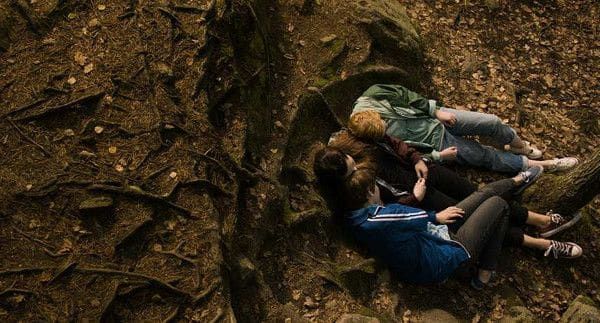Eye For Film >> Movies >> Girls Lost (2015) Film Review
Girls Lost
Reviewed by: Jane Fae

This is probably not the place to go into lengthy explanation of how I failed to catch Girls Lost (Pojkarna) when it first came up for the review. Let's just whisper, 'lost password and personal incompetence', and leave it at that. But I am glad that I finally caught it this week when it came out on Sky Films.
For this is a trans/LGB film with a difference: the story of what happens when three teenage girls, virtual outcasts within their school year, encounter a plant whose nectar is capable of transforming them into boys. This is what makes it different, because the start point is transformation, a state and a status that has consequences.

The focus of far too many trans films is yawningly predictable - the process of transition, combined almost as often with the dire circumstance that attends such transition. We are all too familiar with trans woman as tragic heroine, victim of her own gender and while some films occasionally break free of this, the consensus among many in the trans community is, “Please give us something better than this!”. A little hope would be a start.
Oh dear! In one sense, Lost Girls fails to come through on the hope angle. However, by finessing the process – by making transition as easy as a sip of nectar from a cracked teacup – it does allow director Alexandra-Therese Keining to fast-forward to the challenges raised by that transition.
The film – in Swedish, with English subtitles - starts with three girls, Kim (Tuva Jagell), Momo (Louise Nyvall) and Bella (Wilma Holmén). They are close friends, driven even closer by being victims of cruel and appalling bullying at their school. I am unfamiliar with the Swedish education system but one aspect of the film I found harder to believe than the magic gender-changing flower was the extent to which such bullying went on in, and was almost endorsed by, the Swedish educational system.
The flower makes its appearance early on and the girls' first experience with gender-change is great fun and well done. Their male alter egos (Emrik Öhlander, Alexander Gustavsson and Vilgot Ostwald Vesterlund) are like, yet unlike the girls in outward appearance: Kim, both female and male version, is ambiguously androgynous in a way that fits the subsequent narrative. The transformation is played for laughs as they examine their new bodies and one comments that “she” now has a real cock and it is “like a little bird”.
So far, so good. The girls get to be boys for a night and the consequence, for Kim at least, is massively positive when, the next morning, she returns to femalehood. But all is not fun and laughs. On their second outing, Bella encounters the downside of being a boy and she and Momo decide it is not for them, while Kim, who has previously confided to Momo that all her life she has felt like she is hiding her true self inside, cannot get enough of it.
The situation is complicated by Kim falling for bad boy Tony (Mandus Berg), while in male form: not a brilliant idea when the object of your affection is both a misogynist and a raging homophobe. And she still has more than friendly feelings for Momo. But are those feelings for Momo the girl or Momo the boy? And, as Momo demands of her, does Kim love Tony because she wants to be with him – or to be him?
So many questions and, as the queer edge of society grows and grows more complex, such interesting questions, challenging us, in one filmic episode, to think long and hard about our definitions and expectations of trans, lesbian and gay.
I should add that the film is dark, and not just by virtue of its subject matter. Rather, with so much action taking place in poorly lit hide-outs, in bedrooms with the lights out and under street lights, there were times I could barely make out what was happening. That's one way to cut back on lighting and make-up and not really a criticism: for I enjoyed this film and finished it bubbling with questions and ideas about how we construct our gender and sexual identities.
Reviewed on: 13 Jun 2017














